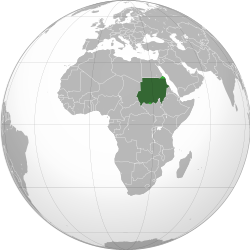Sudan
Sudan is a country in Africa. The official name of Sudan is The Republic of the Sudan. Its capital and largest city is Khartoum.
Republic of the Sudan | |
|---|---|
| Motto: النصر لنا (Arabic) an-Naṣr lanā "Victory is Ours" | |
| Anthem: نحن جند الله، جند الوطن (Arabic) Naḥnu jund Allah, jund al-waṭan (English: "We Are the Soldiers of God, the Soldiers of the Nation") | |
 Sudan in dark green, disputed regions in light green. | |
| Capital | Khartoum 15°38′N 032°32′E / 15.633°N 32.533°E |
| Largest city | Omdurman |
| Official languages |
|
| National language | Sudanese Arabic |
| Ethnic groups | |
| Demonym(s) | Sudanese |
| Government | Federal presidential constitutional republic |
| Abdel Fattah al-Burhan | |
| Malik Agar | |
• Second Vice President | Shams al-Din Khabbashi |
| Osman Hussein (acting) | |
| Legislature | Transitional Legislative Council |
| Formation | |
| 1070 BC | |
| 1885 | |
| 1899 | |
• Independence and end of the Anglo-Egyptian rule | 1 January 1956 |
• Secession of South Sudan | 9 July 2011 |
| Area | |
• Total | 1,886,068 km2 (728,215 sq mi) (15th) |
| Population | |
• 2021 estimate | |
• 2008 census | 30,894,000 (disputed)[5] |
• Density | 21.3/km2 (55.2/sq mi) (202nd) |
| GDP (PPP) | 2018 estimate |
• Total | $177.678 billion[6] |
• Per capita | $4,232[7] |
| GDP (nominal) | 2018 estimate |
• Total | $33.903 billion[8] |
• Per capita | $808[9] |
| Gini (2014) | medium |
| HDI (2019) | low · 170th |
| Currency | Sudanese pound (SDG) |
| Time zone | UTC+2 (CAT) |
| Date format | dd/mm/yyyy |
| Driving side | right |
| Calling code | +249 |
| ISO 3166 code | SD |
| Internet TLD | .sd سودان. |
İslam is its largest religion.
Geography
changeSudan borders by Egypt to the north, Eritrea and Ethiopia to the east, South Sudan to the south, the Central African Republic to the southwest, Chad to the west, and Libya to the northwest. Sudan has a sea to the northeast called the Red Sea.
Sudan used to have the largest area of all the countries in Africa. However, on July 9, 2011, the southern part of the country left and became a new country, South Sudan. Sudan now has an area of 1,861,484 square kilometres (718,723 square miles).[12] It is the third largest country in Africa by area. The Nile flows through Sudan, providing water to crops. There are many different tribal and ethnic groups, though the country is mainly divided between the north, which has more Arabic people, and the south, which has more people of African descent.
Culture
changePeople from Sudan are called Sudanese. About 45 million people live in Sudan. Almost two million people live in the capital Khartoum.[13]
Arabic is the official language of Sudan. Most of the people speak in the Sudanese dialect, which is known as Sudanese Arabic. Beja and Hausa are other Afro-Asiatic languages that are spoken in certain parts of the country. Dinka and Nuer are the main Nilo-Saharan languages spoken in Sudan. Several Nubian and Niger-Congo languages are also spoken. As a former colony of Great Britain, English is also spoken throughout the country.[14]
Islam is the official state religion and the majority of Sudanese are Muslims, mostly Sunni. Along the southern border there are also people who are Christian or animist.[15]
The currency of Sudan is called the Sudanese Pound (SDG) (Jinneh Sudani).[16]
War
changeFor several years, the Darfur conflict has been going on in Sudan. Over 400,000 people have died in it.
Related pages
changeReferences
change- ↑ "People and Society CIA world factbook". 8 March 2022.
- ↑ "الجهاز المركزي للتعبئة العامة والإحصاء" (PDF).
- ↑ "Sudanese Fulani in Sudan".
- ↑ "Sudan Population 2021".
- ↑ "Discontent over Sudan census". News24. Cape Town. Agence France-Presse. 21 May 2009. Archived from the original on 13 July 2011. Retrieved 8 July 2011.
- ↑ "Sudan". International Monetary Fund.
- ↑ "Sudan". International Monetary Fund.
- ↑ "Sudan". International Monetary Fund.
- ↑ "Sudan". International Monetary Fund.
- ↑ "Gini Index". World Bank. Retrieved 16 June 2021.
- ↑ Human Development Report 2020 The Next Frontier: Human Development and the Anthropocene (PDF). United Nations Development Programme. 15 December 2020. pp. 343–346. ISBN 978-92-1-126442-5. Retrieved 16 December 2020.
- ↑ "CIA - The World Factbook". cia.gov. 2011. Archived from the original on February 5, 2019. Retrieved November 29, 2011.
- ↑ "Sudan Population (2022) - Worldometer". www.worldometers.info. Retrieved 2022-05-03.
- ↑ "What Languages Are Spoken In Sudan?". WorldAtlas. 2017-08-01. Retrieved 2022-05-03.
- ↑ "North Sudanese Culture". Cultural Atlas. Retrieved 2022-05-03.
- ↑ "Sudanese Pound (SDG) Definition". Investopedia. Retrieved 2022-05-03.
Other websites
changeMedia related to Sudan at Wikimedia Commons

